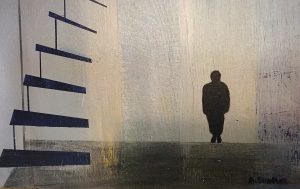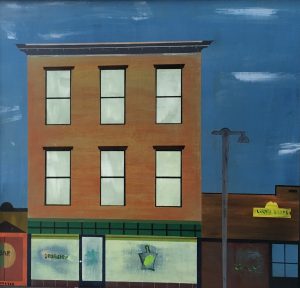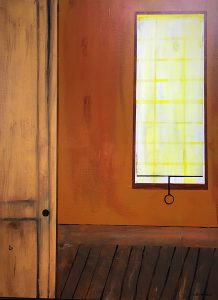Some years ago, when I was a newspaperman at the original Journal-News in Nyack, N.Y., I gave my usual weekly column slot to my son at winter holiday time. He always pens a fictional piece. Here is his writing for 2017.
By Arthur H. Gunther IV
She had outlived him by four years. At least so far. The time it took to get a college degree. Complete high school. The time between Olympic games. One presidential term. A time that could be short and long. She wasn’t the one who measured time. That was always him. She was sure he would have had something to say about four years. It might have annoyed her at one point, but now she missed it more than she could say.
He had had traditions. Things he liked doing again and again. The way he would return to the same books or albums, the same places, as a measure of who he was and where he was going. Who he had been. It gave him perspective. It was his way of slowing down time. He would have been lost without it.
She had been witness to these things. These traditions and revisits. She accepted them and understood as much as she could, but she was different. She didn’t need it like he did.
There were things she knew about him. Things that she had witnessed the origin of, that she could trace to their root, but there were others that had been there from the start. Others that she couldn’t lay claim to. Most things she became a part of. Others she witnessed at arm’s length. Then there were those that were just his. She had hers too. She guessed that all couples did in their own way. She never gave it that much thought.
But now, for whatever reason, she was starting to wonder. Maybe she had spent so much time ruminating over all their shared memories that she became greedy for more of him. Greedy for more stories.
It was December once more and she found her mind wandering back to one of her late husband’s odd traditions. Once every year, always the week before Christmas, he would disappear for a day. He never really explained where he went or why and, for whatever reason, she never really asked him. He explained most everything else, almost to a fault. There must have been a reason for his silence. She figured this one was just his. All she could recall was the old flannel shirt he always wore when he left.
As December continued, she found herself becoming consumed by the thought of this odd tradition. Where before she hadn’t cared, now she found herself wondering. Where had he gone all those years?
One day, a week before Christmas, she was rummaging through the one drawer that remained of her husband’s clothes. The rest she had given away, but there were still a few she held on to. On the bottom of the drawer was a shirt. She pulled it out and considered it. Staring at its pattern, it quickly occurred to her that this was the one he had worn on those mysterious December days. There was nothing special about it. It was worn thin in spots, maybe a bit of an unusual shade of blue if anything. The kind that was never really in or out of style. She put it on and smoothed it down over her. It was a bit big. Her hand found her way to the front pocket. Reaching inside, she found a weathered piece of lined paper with an address written on it: 151 W. 34th St., 8th floor.
The next morning, she found herself boarding the train to Manhattan, suddenly intent on finding what was her husband’s connection to the address. It must have had something to do with his yearly ritual. She could have just looked it up, but something told her to just go and see. That’s probably what he would have done himself if the situation were the same. She took the 45 minute train ride to the subway and then got out and walked. She didn’t have far to go from the station before there it was, towering in front of her: 151 W 34th St: Macy’s department store. There was no shortage of people entering and exiting the store, along with all those who were just there looking at the holiday windows. Entering the crowded, warm store, she took her jacket off, revealing her husband’s old shirt that she had purposely worn. She had, of course, been here before, but it had been years, not since their children were young. She made her way over to the escalators and began to make the climb up to the 8th floor. The modernity that stood out on the first levels slowly faded. By the 7th floor, surprisingly, the escalator became one of the old wooden ones. She was surprised to see that they still existed. She got off on the 8th floor and found that the floors, like the escalator, remained all wood. The old long wooden planks were unevenly worn. She began walking around and found that this floor was the location of the bed department. None of it made any sense. She followed the wooden floor around the corner to the far side of the building and found that, nestled between beds and bedding was the Macy’s Christmas ornament shop. She slowly remembered that the last time they had been there, this was where they went. It was an oasis of silver and gold, tinsel and light, standing in stark contrast to the plain white mattresses that occupied the bulk of the floor. What a magical place! She saw a bench against one wall and sat down to take it all in.
It couldn’t have been more than a few minutes when she looked up to see a man staring at her. He walked over and began to speak.
“I’m sorry to bother you, but is there any way you know Pete?” Pete was her husband’s name.
“Yes…I’m his wife.” The man looked relieved.
“Oh, that’s good news. We were all wondering where he’s been. We haven’t seen him in four years.”
She couldn’t imagine how confused she must’ve looked. She managed to get out, “How do you know my husband? How did you know to ask me about him?”
“Oh, sorry. It’s the shirt. Pete always wore that shirt when he came. So how is he? Where’s he been?”
The familiarity this stranger had with her husband threw her for a loop, but she answered anyway. “I’m sorry to tell you, but he passed away four years ago. He was 88.”
The man couldn’t hide the shock on his face. He immediately sat down on the bench. “That is terrible news. I knew he was getting old, but he seemed so strong. I would have never guessed his age. He never told us.”
She let a minute or so pass with this strange man who somehow knew her husband sitting beside her. Eventually she managed to ask, “How did you know my husband?”
The man looked surprised, “You don’t know?” She shook her head. “Pete had been coming here once a year the week before Christmas for 40 years. Well before I started here. He was a bit of a legend. The employees from the Christmas shop would pass down his story to each other.”
Her silent gaze urged the man to say more. “As I understood it, Pete had some arrangement with the managers of the Christmas department. They let him come every year and work for a day selling ornaments and decorations. He was so excited to be here. I know he didn’t get paid. He said it was his own tradition. He would talk about his children. How they had come up here once together when they were young. He would tell us about his wife.” He stopped for a minute, “You. He said he loved it up here where things still looked old and handmade and slow. I actually remember exactly how he put it. Pete said being up here, if only once a year, helped him slow down time. Something about letting the year all catch up to him.” He stopped for a moment. “He seemed like a good man.”
Pete’s wife, who had been speechless for the last minute, only could nod and think, yes, yes he was.
The writer is a teacher at the William O. Schaefer School in Tappan, N.Y. He lives in Upper Nyack, N.Y. clausland@yahoo.com



